Grants Focus
PRIMARY FOCUS: FPE's National and Regional Environmental Agenda
FPE has identified specific priority concerns to comprise its National Environment Agenda (NEA), namely, mining, logging, unsustainable agricultural and fishing practices, renewable energy, solid waste and air pollution, climate change and disaster risk reduction, and urbanization and land conversion.
The NEA was derived from the results of the Foundation’s Regional Environmental Agenda (REA) discussions, a series of grounded and community-based consultative processes which involved FPE’s partners (civil society organizations, cooperatives, volunteers, and people’s and indigenous people’s organizations). These meetings drew out the regional (Luzon, Visayas, and Mindanao) perspectives in environmental protection from the participating members, and also solicited input from the Foundation’s Board of Trustees, Regional Advisory Councils (RACs), and staff. The national agenda was formally established in 2011.
Mining
Logging- Unsustainable
Agriculture
and Fisheries
Renewable
Energy- Solid Waste
and Air
Pollution - Climate
Change and
Disaster Risk
Reduction - Urbanization
and Land
Conversion
Mining
Mining was identified as the top priority issue in the Luzon and Mindanao REAs and ranked second in the Visayas. Indeed, legal or otherwise, aside from being a primary contributor to the degradation of the country’s forest cover, it also results in the displacement of and discord among local indigenous communities.
The Foundation is therefore pushing for the critical review of existing laws and policies covering the mining industry, as well as the independent monitoring of mining concessions and violations of mining-related environmental laws. In addition, the adoption of a “people’s mining policy” through an alternative to the Philippine Mining Act of 1995 (RA 7942) and the enactment of the Mineral Management Bill for a Philippine Resources Act are being pursued in terms of legislation.
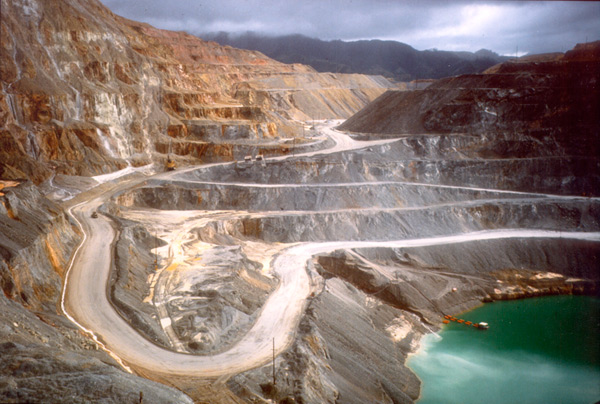
The 1996 Marcopper Mining incident in Marinduque remains one of the most telling
illustrations of the inherent risks involving the mining industry. (FPE file photo)
Further reading:
- Republic Act No. 7076: People’s Small-scale Mining Act of 1991
- Republic Act No. 7942: The Philippine Mining Act of 1995
- Executive Order No. 79: Aquino Mining Reforms Policy (2012)
- House Bill No. 206: Alternative Mining Bill
- House Bill No. 3763: Minerals Management Bill
- House Bill No. 4315: People’s Mining Bill
- Alternative Minerals Management Bill: A Reader (via SOS-Yamang Bayan Network)
- A Primer on the People’s Mining Bill (Center for Environmental Concerns)
- Challenging the Mining Act: High Time for a Pro-Environment, Pro-People Mining Policy (Center for Environmental Concerns, February 2012)
Logging
Like mining, logging ranks among the top two key issues across Luzon, Visayas, and Mindanao, due to its long-running destructive and unsustainable impacts upon the nation’s ecological resources. Further worsening the situation are inadequate legislature and legal enforcement of existing forest protection policies that enable illegal and indiscriminate loggers to take advantage.
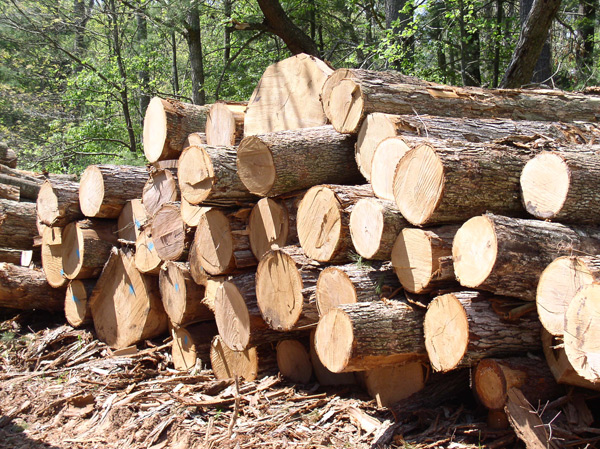
Moving to curtail the destruction of forest cover will do wonders in preserving the ecological
services upon which biodiversity is dependent. (FPE file photo)
The assessment and documentation of tenurial instruments, existing logging concessions and forest cover quality, as well as the review of laws, ordinances, and instruments/implementing rules governing logging activities are cited as key actions to undertake. In light of these, earning the support of people’s organizations and local government units in patrolling forests as well as the prosecution of offenders of environmental laws are necessary. The halting of large-scale logging operations and the issuance of new or extended Timber Licensing Agreements (TLAs) are also recommended.
Further reading:
- Republic Act No. 9175: Chainsaw Act of 2002
- Executive Order No. 23: Aquino Log Ban (2011)
- House Bill No. 5485: Sustainable Forest Management Bill (2011)
- DENR: National Greening Program (Includes legal provisions, reports, and other resources)
- DENR-FMB: Primer on Illegal Logging
- DENR-FMB: Criteria and Indicators for Sustainable Forest Management (undated)
- DENR-FMB: Revised Master Plan for Forestry Development (2003)
- DENR-FMB: 2011 Philippine Forestry Statistics
- DENR-FMB: Essential Forestry Statistics
- ADB: Key Indicators for Asia and the Pacific 2013
- ADB: National REDD+ Strategies in Asia and the Pacific: Progress and Challenges (2010)
Unsustainable Agriculture and Fisheries
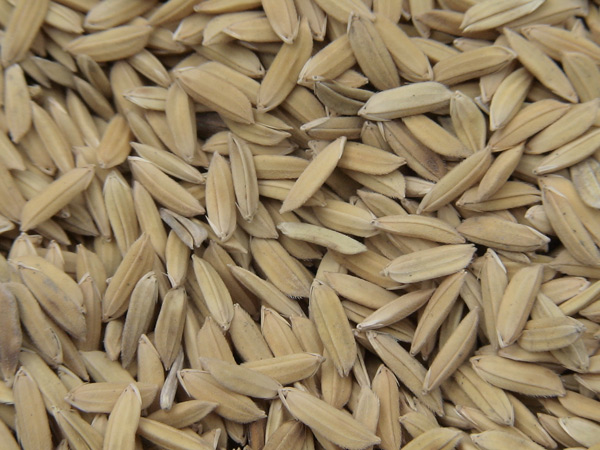
Sustainability in the agricultural sector involves ensuring genetic purity of plant crops by way of
supporting organic agriculture. (FPE)
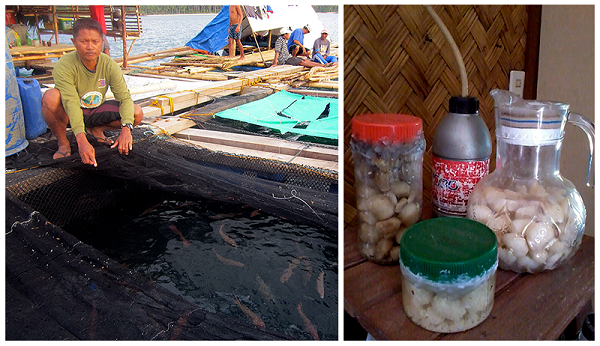
The aquaculture scene also merits due attention to ensure that destructive, unsustainable fishing and marine resource harvesting practices are avoided and ultimately eliminated. (PNNI)
The emerging trends involving genetically modified organisms and other unsustainable agri- and aquaculture practices threaten long-term productivity across all regions of the Philippines. It has been agreed that the inventory and improvement of marine protected areas (MPAs), the proper implementation of the National Organic Agricultural Act of 2010 (RA 10068), the review of the Philippine Fisheries Code of 1998 (RA 8550), and the opposition to genetically modified crops and plantations must be ensured moving forward. There is a call for a paradigm shift in favor of organic agriculture and crop diversity (as opposed to monocropping) with practitioners sharing best practices and technologies especially in the grassroots level.
Further reading:
- Republic Act No. 10068: Organic Agriculture Act of 2010
- Republic Act No. 10601: Agricultural and Fisheries Mechanization (AFMech) Law
- Executive Order No. 481: Promotion and Development of Organic Agriculture
- DA-BFAR: Philippine Fisheries Legislation
- Bureau of Agricultural Statistics: Philippine Agriculture in Figures (2012)
- DA-BFAR: Managing Aquaculture and its Impacts: A Guidebook for Local Governments (2007)
- DA: Social and Environmental Safeguards Framework for the Philippine Rural Development Framework (2012)
- UN-FAO: National Aquaculture Sector Overview: Philippines
- Philippine Clearing House Mechanism for Biodiversity: Agricultural Biodiversity
- World Bank: Growing Aquaculture in Sustainable Ecosystems (2013)
- Norwegian Institute for Water Research: Aquaculture in the Philippines: Socioeconomics, Poverty, and Gender (2007)
Renewable Energy
FPE has also identified renewable energy as a key point of focus in its national agenda, in tune with the global clamor to pursue options that mitigate the contributory effects of fossil fuel consumption to the climate change phenomenon.
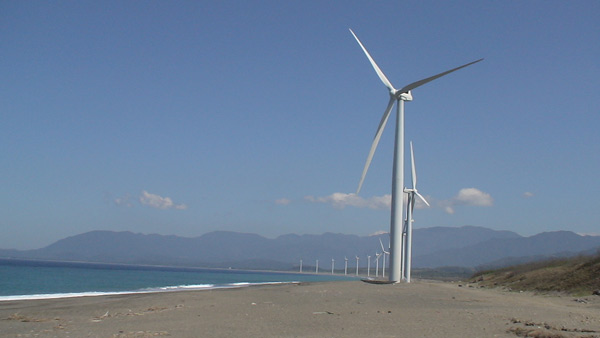
The Bangui windmills of Ilocos Norte represent a step in the right direction for renewable energy
adaptation. (FPE file photo)
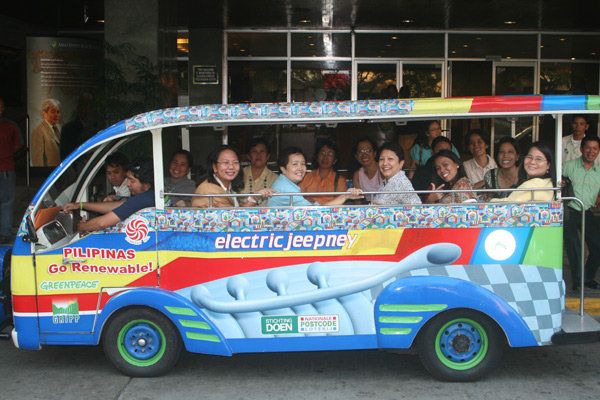
Innovations such as e-jeepneys are being promoted to help push forward more energy-efficient
solutions that can instantly translate into practical benefits for the public. (FPE file photo)
The monitoring of coal-fired and other non-green energy sources, the promotion of renewable energy as a viable alternative, and the conscious reduction of energy consumption are the main recommended actions to decrease reliance on fossil fuels which are both scarce and harmful to the environment and human health.
Further reading:
- DOE: Download Links for Energy-related Legislation
- DOE: Renewable Energy Program
- GIZ: Renewable Energies for Off-grid Power Generation in the Philippines (2013)
- GIZ Study: Renewable Energy in PH Affordable in Long-term (2013, via Rappler)
- Clean Technology Fund Investment Plan for the Philippines
- International Energy Agency: Key World Energy Statistics (2013)
- ADB: Asian Development Outlook 2013: Asia’s Energy Challenge
- ADB: Freedom to Grow: Impact Stories from the Philippines (2010) (Pages 6-9, 10-11)
- Infographic: How Much Would it Cost for the Entire Planet to Switch to Renewable Energy (2013)
Solid Waste and Air Pollution
Solid waste and air pollution continue to be a nationwide concern due to weak enforcement of already existing legislation, further leading to a lack of consciousness in responsible waste management. The results are clearly visible, and constantly worsen the disaster risk situation during typhoon season.
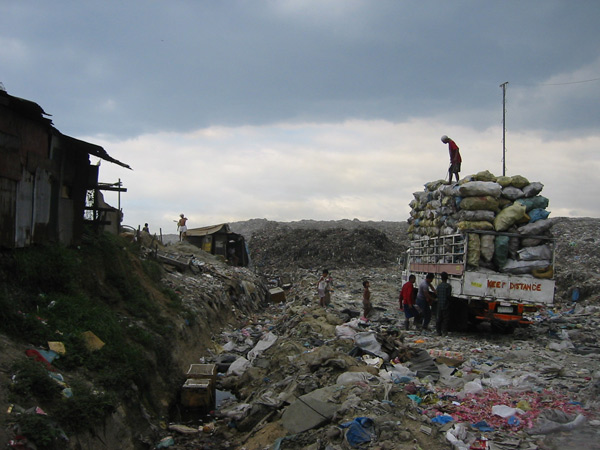
The current state of waste management in the country leaves much to be desired. (FPE file photo)
In this light, the strict and proper implementation fo the Philippine Ecological Solid Waste Management Act of 2000 (RA 9003), the Clean Air Act of 1999 (RA 8749) which espouses the principle that polluters must pay, and the Clean Water Act of 2004 (RA 9275) which seeks to protect fresh, brackish, and marine waters are the recommended actions. The three Rs campaign (reduce, reuse, and recycle) is deemed helpful and relevant in order to reduce waste and pollution.
Further reading:
- Republic Act No. 9003: Philippine Ecological Solid Waste Management Act of 2000
- Republic Act No. 8749: Clean Air Act of 1999
- Republic Act No. 9275: Clean Water Act of 2004
- DENR-EMB: Guidebook on Environmental Management System, Pollution Prevention/Cleaner Production, and Environmental Cost Accounting (2003)
- DENR-EMB: Air Quality in the Philippines (~2008)
- WB: Unraveling the worldwide pollution haven effect (2006)
- WB: 2010 Environment Strategy: Managing Pollution for Poverty Reduction and Green Development
- ADB: Key Indicators for Asia and the Pacific 2013
- ADB: Knowledge Management on Air Quality: Case Studies (2010)
Climate Change and Disaster Risk Reduction
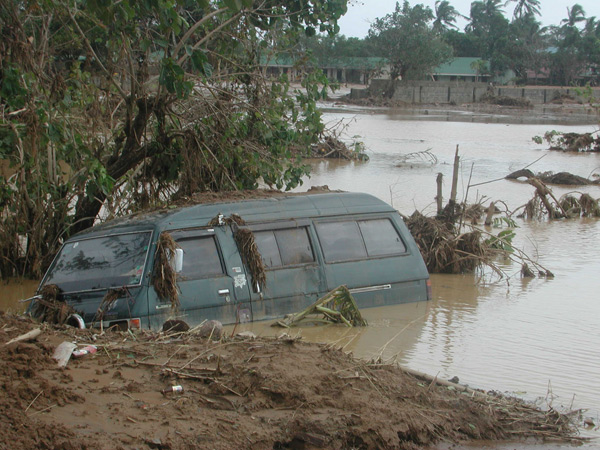
Acknowledging climate change and addressing its impacts can help lead to better preparation for weather-related calamities in the future. (FPE file photo)
If the past few years have been any indication, the impacts of climate change on weather patterns are becoming increasingly tangible as soon as the stormy season arrives. FPE proposes action on addressing climate change and disaster risk reduction as another key priority.
The support for principles embodied in the Climate Change Act of 2009 (RA 9279), advocating people’s rights to a healthful ecology, and the integration of both disaster risk management and renewable energy in policy-making have been proposed to make communities more resilient to the risks brought about by natural calamities and climate change.
Further reading:
- Republic Act No. 9729: Climate Change Act of 2009
- Republic Act No. 10121: Disaster Risk Reduction and Management Act of 2010
- DENR: Climate Change Adaptation Best Practices in the Philippines (2013)
- NASA: Climate Change Key Indicators
- IPCC: Fifth Assessment Report - Summary for Policymakers
- ADB: Moving from Risk to Resilience (2013)
- ADB: Climate-related Disasters in Asia and the Pacific (2013)
- ADB: Building Resilience to Climate Change: Adaptation Technical Resources (2013)
- ADB: The Economics of Climate Change in Southeast Asia: A Regional Review (2009)
- WB: Getting a Grip on Climate Change in the Philippines: Extended Technical Report (2013)
- Human Development Network: The “Alliance of 7”: Climate Change Adaptation in the Greater Metro Manila Area (2012)
- WB: Five Feet High and Rising: Cities and Flooding in the 21st Century (2011)
- UNEP: Kick the Habit: A UN Guide to Climate Neutrality (2008)
- WMO: The Global Climate 2001-2010: A Decade of Extremes (Summary Report) (2013)
- The Implications of Population Growth and Urbanization for Climate Change (2009)
Urbanization and Land Conversion
As a country endowed with a rich natural resources, the Philippines has in its best interests the proper protection and sustainably managed utilization of its lands for the common benefit of local communities and the nation as a whole.
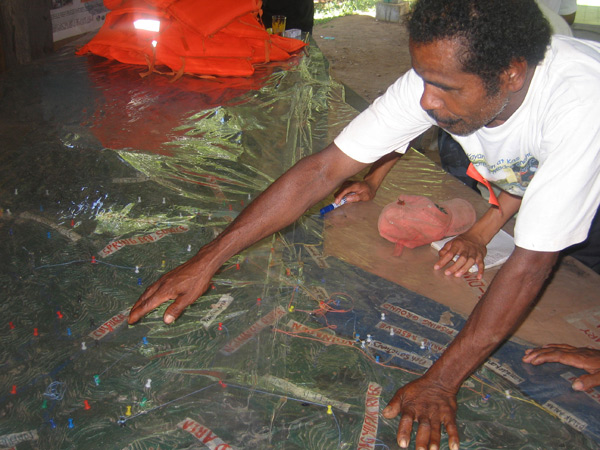
In dealing with matters of land use and conversion, considerations should ideally be examined through a multi-dimensional (economic, environmental, social, cultural, et al.) lens. (FPE file photo)
The critical review of national land use policies and the lobbying for the passage of a land use bill are two actions called for in terms of the issue of land conversion. Meanwhile, in the context of conversion of lands for urbanization, the comprehensive identification of the social, economic, and environmental costs and opportunities is also emphasized.
Further reading:
- Republic Act No. 9700: Comprehensive Agrarian Reform Law with Reforms (CARPER)
- House Bill 6545: National Land Use and Management Bill
- PRIMER | An interactive guide to the National Land Use Bill, and what it means for you (2012)
- DAR: Handbook on Community Processes on Rural Infrastructure Development
- World Health Organization: Urbanization and Human Health
- Bureau of Agricultural Statistics: Agricultural Indicators System: Redistribution of Land
- Human Development Network: 2012/2013 Philippine Human Development Report (2012)
- Urbanization Process and the Changing Agricultural Landscape Pattern in the Urban Fringe of Metro Manila, Philippines (2007)
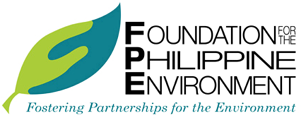
 DISPLAY CALENDAR
DISPLAY CALENDAR

 Read Policy Briefs
Read Policy Briefs
 View Our Partners
View Our Partners
 Access Grants MIS
Access Grants MIS
 Login to Webmail
Login to Webmail